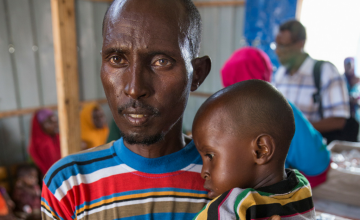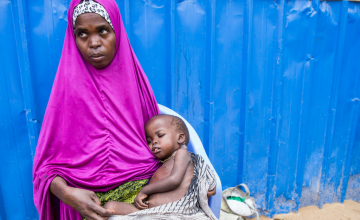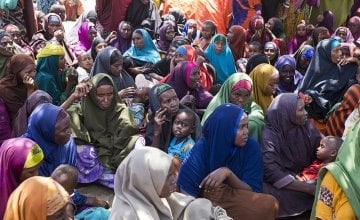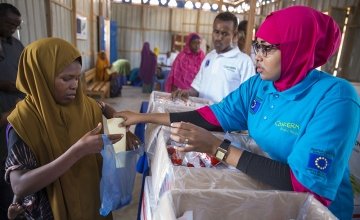
Read our 2023 annual report

Knowledge Hub
Somalia on the brink of famine
As prolonged drought is wreaking havoc across east Africa, the situation in Somalia is terrifyingly reminiscent of the 2011 famine, when over 250,000 Somalis lost their lives to hunger and disease.
The current drought is in fact the most severe in living memory in Somalia – the result of three failed rains in a row. The situation is so bad that two of the country’s major rivers – the Shabelle and the Jubba – have totally dried up. Even in 2011, it was possible to access water by digging into the river beds, but this time the water tables have run completely dry.
500,000 displaced from their homes
Wells have dried up, crops have failed and livestock, thirsty and hungry, are dying in massive numbers. Their carcasses lie scattered across the arid country landscape. Food prices are soaring and people have been left with no choice but to leave their homes and villages in search of food and water. An estimated 500,000 Somalis have been displaced from their homes so far, headed towards the towns and cities. This number is only set to increase.
In Mogadishu, hundreds of families are arriving into the displacement camps each week, having walked huge distances for days, sometimes weeks, in urgent search of food and water.
A harrowing journey
Abdullahi* is one of the many people who have undertaken the long trek. It took him nine days to reach Mogadishu. Back home, all thirty of his cattle died as a result of the drought. With his livelihood destroyed, and food and water in short supply, Abdullahi made the decision to leave his village and seek treatment for his four year old son, Abhsir*. His two other children remained at home with their uncle.

The journey is filled with unimaginable suffering for some. Aayan* and her baby Aadan* arrived at a Concern nutrition centre in late March. They made it there after a harrowing 60 kilometre trek. Aayan lost two of her children along the way. There was just nothing she could do to save them.
When Aadan was assessed by our team, he weighed only nine kilograms. He is three years old. Suffering from loss of appetite, oedema and skin disease, he was diagnosed as severely malnourished and has been admitted for the care he so urgently needed.

Disease spreading quickly
There are hundreds of thousands of children who are suffering like Aadan and Abshir. And in drought conditions like this, hunger is not the only risk to peoples’ lives. A lack of water leads to poor sanitation and disease spreads quickly. Cholera is increasing at a worrying rate and according to the World Health Organisation (WHO), over 25,000 cases have been recorded in Somalia since the beginning of the year. The case fatality rate is reported to be 2.1%, which is double the emergency threshold rate. Under ordinary circumstances, cholera can be easily treated. But malnutrition and dehydration weaken people’s ability to fight it.
Worst is yet to come
Lessons learned from the past have so far prevented loss of life on the scale of 2011. Early warning systems established in the wake of that devastating famine have allowed for earlier preparations this time around. But ongoing conflict makes it very difficult to reach people in some of the worst affected areas. And the severity of this drought means the worst is yet to come.
Minor rains have recently been reported in parts of the country. These could signal the beginning of the Gu rains which typically fall between April – June. It is too early to tell if they will be sufficient to bring any relief to the millions of Somalis whose lives are at risk from hunger and disease. But even if the rains do arrive, it would take months for crops to grow and even longer for families to rebuild their livelihoods.

Threat of famine is looming large
Some 6.2 million people do not have enough food to eat and are in urgent need of food assistance – that is over half the country’s population. And more than 350,000 children under the age of five are acutely malnourished. So far, humanitarian aid has helped to minimise the loss of life. But the sheer scale of this crisis is overwhelming and the threat of famine is looming large.
*Names have been changed to protect identities
How Concern is helping

We have massively scaled-up our operations to respond to the increasing numbers of people who need urgent assistance. Our experienced team on the ground are providing those most in need with clean water and cash transfers to buy food. We are distributing essential shelter and household items to people living in informal displacement camps. And we are providing life-saving nutrition support to malnourished children.
You can help to save lives
With your support we can reach even more people and save the lives of more children like Aadan and Abshir. Please donate today.
In depth





